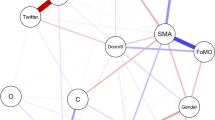Summary
For each of 22 essentially uncorrelated deviant acts the following hypothesis was tested: Among persons who report not having performed the act during a period prior to the first testing, regardless of initial level of self-derogation, individuals who report (a year later) at the second testing having performed the deviant act during the intervening year will have manifested significantly greater increases in self-rejecting attitudes over the same period than persons who report not having performed the act.
Data were obtained from participants in a longitudinal study of junior high school students who responded to questionnaires at the first two testings.
Self-attitudes were measured by scores on a self-derogation scale. Change in self-derogation from the first to the second testing was determined by expressing the later score as a deviation from the posttest-on-pretest regression line.
Deviant behaviors were indicated by self-reports.
The change score comparisons between persons who reported and did not report deviant responses at the later time were made separately for persons with initially low, medium, and high self-derogation scores respectively.
The comparisons were in the hypothesized direction in all 66 (22 deviant acts X 3 initial selfderogation levels) instances. In 58 instances the results were significant.
The strong support for the hypothesized association between deviant responses and increases in self-rejection is interpreted as congruent with the position that the genesis of negative self-attitudes is a common influence in the adoption of deviant responses in general.
Similar content being viewed by others
References
Brownfain, J.: Stability of the self-concept as a dimension of personality. J. Abnorm. Soc. Psychol. 47, 597–606 (1952)
Clifford, E., Clifford, M.: Self-concepts before and after survival training. Br. J. Soc. Clin. Psychol. 6, 241–248 (1967)
Cronbach, L. J., Furby, L.: How should we measure “change” — or should we? Psychol. Bull. 74, 68–80 (1970)
Dittes, J. E.: Effect of changes in self-esteem upon impulsiveness and deliberation in making judgements. J. Abnorm. Soc. Psychol. 58, 348–356 (1959 a)
Dittes, J. E.: Attractiveness of group as function of self-esteem and acceptance by group. J. Abnorm. Soc. Psychol. 59, 77–82 (1959 b)
Engel, M.: The stability of the self-concept in adolesence. J. Abnorm. Soc. Psychol. 58, 211–215 (1959)
Frankel, A. S.: Attitudes toward a group as a function of self-esteem, group achievement level, and success or failure on a grouprelevant task. Proceedings, 77th Annual Convention, APA 4, 351–352 (1969)
French, J. R. P.: The conceptualization and measurement of mental health in terms of self-identity. In Sells, S. B. (ed.) The Definition and Measurement of Mental Health, pp. 136–159, U.S. Dept. of HEW, Public Health Service, Health Services and Mental Administration, National Center for Health Statistics, Washington, D.C. (1968)
Kaplan, H. B.: Toward a general theory of psychosocial deviance: the case of aggressive behavior. Soc. Science Med. 6, 593–617 (1972)
Kaplan, H. B.: Self-Attitudes and Deviant Behavior. Pacific Palisades, California: Goodyear Publishing Company 1975
Kaplan, H. B., Pokorny, A. D.: Self-derogation and psychosocial adjustment. J. Nerv. Ment. Dis. 149, 421–434 (1969)
McGuire, W. J.: Personality and susceptibility to social influence. In Borgatta, E. F. and Lambert, W. W. (eds.), Handbook of Personality Theory and Research, pp. 1130–1187, Chicago: Rand McNally and Company 1968
Rosenberg, M.: Society and the Adolescent Self-Image. Princeton, New Jersey: Princeton University Press 1965
Silverman, I.: Differential effects of ego threat upon persuasibility for high and low selfesteem subjects. J. Abnorm. Soc. Psychology 69, 567–572 (1964)
Stotland, E., Thorley, S., Edwin, T., Cohen, A. R., Zander, A.: The effects of group expectations and self-esteem upon self-evaluation. J, Abnorm. Soc. Psychol. 54, 55–63 (1957)
Welch, B. L.: The generalization of “students” problem when several different population variances are involved. Biometrika 34, 28–35 (1947)
Author information
Authors and Affiliations
Additional information
Portions of this paper were presented at the VIII World Congress of Sociology, International Sociological Association, Toronto, Canada, August 19–25, 1974 and at the Bienniel Meeting of the International Society for Research on Agression, August 17–18, 1974, Toronto, Canada.
Rights and permissions
About this article
Cite this article
Kaplan, H.B. Self-attitude change and deviant behavior. Soc Psychiatry 11, 59–67 (1976). https://doi.org/10.1007/BF00578739
Issue Date:
DOI: https://doi.org/10.1007/BF00578739



